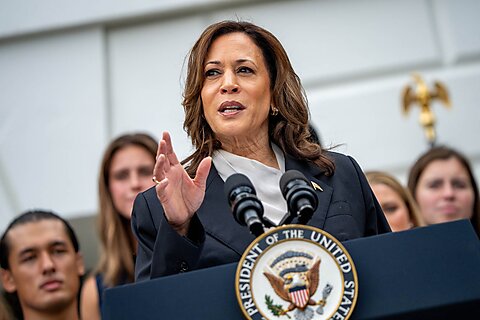
Tad DeHaven
Democratic presidential candidate Kamala Harris released a “policy book” this week, laying out the policies she would pursue in office. It clocks in at eighty-two pages, but approximately fifty pages have text as there are lots of pictures and filler.
Inspired by my colleague Chris Edwards’ selected word count for the president’s fiscal 2024 budget, I decided to do the same with the Harris policy document. For people who don’t have the time or interest in reading the entire Harris document (i.e., normal people), this should quickly provide the gist. (Note: I tried to omit instances where a word’s usage was unrelated to proposed policies.)
The first word that pops out when looking at the table of contents is “lower,” as in lower costs for Americans, which Harris is promising to do for, well, just about everything. Indeed, “lower” and its related variants like “lowering” show up almost 40 times. I recommend reading my colleague Ryan Bourne’s book, The War on Prices, to understand why one should be wary of politicians pursuing such a seemingly noble cause.
The big winner is “invest” and variations like “investments,” which clocks in at almost 70 times. Sometimes, grandiose adjectives are added to describe these “investments,” like “historic” or “largest.” When politicians say “invest,” it’s almost always a euphemism for spending more money via taxes and federal debt. Sure enough, that’s the case with Harris’s policy proposals. Other words that politicians euphemistically employ so they don’t have to say “spending” are “support” and “strengthen.” The former (and its variants) clocks in at almost 30 times, the latter more than 20.
Some words and phrases tellingly don’t make an appearance. Searching for things like “lower spending,” “cutting spending,” and “reduce spending” (and variations of) turns up zero results.
Interestingly, “spending cuts” make one appearance. On page 9 I found this:
The Wall Street Journal agrees: ‘Vice President Harris, the Democratic nominee and GOP rival Donald Trump aren’t the same on fiscal policy. She has outlined or endorsed enough fiscal measures—tax increases or spending cuts—to plausibly pay for much of her agenda. He has not.’
The footnote shows that the quote comes from a September article written by Wall Street Journal reporter Richard Rubin titled, “Federal Debt Is Soaring. Here’s Why Trump and Harris Aren’t Talking About It.” It’s not exactly a flattering piece on the vice president, and I’m not even sure what spending cuts Rubin is talking about other than proposing to save on Medicare prescription drug costs.
In sum, the word count indicates more spending, more debt, and federal meddling with prices under a Harris administration.








